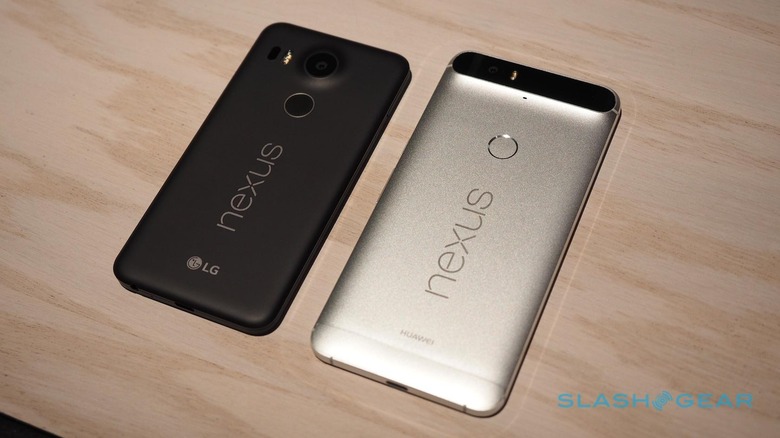Google Phone Might Not Be The Best Move For Android
It's like the early 2000s again. With Apple finally launching the first ever iPhone, there is talk about Google doing something similar. Of course, that happened and it didn't, with the Nexus line the closest thing to a "Google phone". Fast-forward nearly a decade, Google is rumored to once again try its hand at actually becoming a smartphone maker too. Like Apple. It doesn't make business sense, of course. But what if it were true? What if Google din put out a "gPhone"? It definitely can, like the Pixel C Android tablet. But if it did, this non-Nexus Google-made Android smartphone would be an atrocity for consumers. Here are the reasons why.
Google's hardware track record
Google is primarily a software company, with products that span the Web, mobile devices, and now smart home appliances. It has put out hardware of its own, but with a few exceptions, almost all of those were made by hardware partners. The only ones of note that Google made by itself are the Chromecast, which was an overnight success, the Chromebook Pixels, which were so-so, and the Pixel C tablet, largely regarded to be a flop, though due to the software, mind you.
You could, perhaps, argue that Google has learned a lot from those partners, enough to make its own device. The Pixel C is admittedly a very nice piece of hardware, but it also reveals an important flaw. There are very few fans of how Google decided to implement the magnetically attaching keyboard cover. It was fancy, innovative, and strong. But it was also frustrating to use.

Knowing how to make a device doesn't necessarily translate to designing a device well. Google, sadly, hasn't inspired much confidence yet in that area.
Google's Nexus vision
Google's Nexus smartphones are made by chosen hardware partners, but its technical design is largely dictated by Google. What's there is there because Google said so. But that also means what's not there is also missing because Google said so.
Even before Samsung stirred the hornet's nest by taking away removable batteries and microSD card slots, Nexus devices have had none of those. The reason why the Internet hasn't made much of a big stink about it is because Nexus devices aren't destined to be sold in high volumes. They appeal more to purists, developers, hackers, and those sick and tired of OEM shenanigans. That, however, means accepting Google's vision of Android in totality. Before, there were Google Play Editions that served as a middle ground, but that race has long been extinct.
The Nexus devices represent Google's vision of the perfect fusion of Android sofware and hardware. And, truth be told, not all of it has resounded with what users have come to expect in their devices. Google is known to loathe removable memory and has banished those cards from its Nexus. It came close to imposing its will on all of Android, only to compromise later with Adoptabe Storage. Come Android N, it will fully launch split-screen windows but will not enable free-form windows on Nexus devices. The functionality is there, but Google will snub it.
Google has shown its vision of a perfect Android smartphone in the Nexus, and it reveals a disjunct with majority of consumers. There is little evidence to believe a Google Phone would be different in this regard. With Google fully at the helm, it could be even worse.

Vanilla Android isn't as sweet
Let's be honest here. What percentage of Android users actually enjoy using Google's version of Android without modification? Yes, OEMs like Samsung and Chinese companies go overboard with customizations. And yes, there are definitely those who fall head over heels in love with Android as Google implements it. But even those might have a tweak or two to augment the interface, and even those have complained when Google takes away experimental features in Android betas, like dark color themes or quick toggle options.
Android, straight from Google and the Android Open Source Project, is completely functional and basically usable, but it always feels like failing to travel the last mile in terms of user experience. We may or may not agree with all the modifications that OEMs make, but some of those have become so common that Android itself would have an official version of it. And even then, OEM skins still provide additional experiences that even some apps can't provide.
It probably won't be a stretch to imagine that, given the hardware and software considerations above, a Google Phone might fail to wow a market that has come to expect all the bells and whistles from a smartphone experience.
Business suicide
Our Chris Burns has already tackled this matter extensively, so we won't repeat his fine words. Suffice it to say, a Google Phone that is marketed as THE Android smartphone would alienate and drive away the very people that have helped make Android a success. Google would have very big shoes to fill should it come to that, and its feet might not be enough.
It doesn't fix Android #1 problem
At the end of the day, the speculated impetus for Google even considering making its own smartphone is to have more control over Android, and that desire is largely driven by the much criticized fragmentation of the Android market. That is a very real problem that definitely needs a fix, and soon. But a "Google Phone" would actually make it worse.

Photo courtesy of XKCD
There are many possible solutions to fragmentation, which probably deserves a piece of its own, but few or none of those involve Google putting out an official Android phone. Unless Google would be able to magically replace all OEM devices with its own phone, fragmentation will remain for a long time, and is even worsened by the addition of another brand. And that's presuming this device is even able to sell in the millions. Anything less, and it wouldn't even make a dent in the problem.
Part of the effects of fragmentation is the snail-paced rollout of updates to devices. Google already circumvents OEMs and carriers in Nexus devices and presumably that will be the same strategy it will use with its Google Phone. But while that might be true for the Nexus and the Google Phone, it's not the same for the millions of devices in the market.
Google stands a better chance of fixing the problem by improving the Android update process. Maybe it can even start to force OEMs to comply (which is a debate for another topic). The only way a Google Phone would be able to solve Android fragmentation would be if it replaced even just 75% of the branded devics in the market. Not gonna happen.
Wrap-up
So is Google really going to put out its own non-Nexus Android phone? It definitely can, technically speaking. And it still might. But if it thinks it will be the Android smartphone to topple all other Android smartphones and, in the process, topple the iPhone's lead, it might have another thing coming. At most, it can just be the evolution of the Nexus, eventually replacing those OEM-made devices with Google's own. But like those Nexus devices, it most likely won't be made for truly mass consumption.
A Google Phone would be the ultimate embodiment of Google's vision of the perfect harmony between hardware and Android software. But as much as Google is credited for its work on Android, its vision might not be something that most users will be able to see, much less appreciate.
